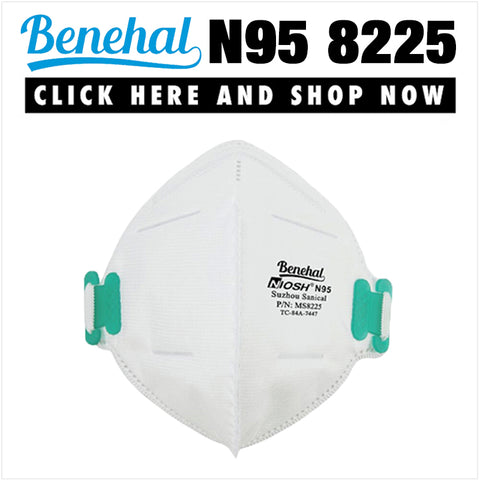Do N95 Masks Help During The Winter?
Posted by S. Kit on
Wearing an N95 mask can be an effective way to prevent the spread of COVID-19, especially during the winter months. These masks are designed to fit tightly over the nose and mouth and can filter out at least 95% of airborne particles, including those that carry the virus.
In this blog post, we will explore the science behind how N95 masks work, and the evidence that supports their effectiveness in preventing COVID-19 transmission during the winter.
The COVID-19 virus is spread through respiratory droplets that are released into the air when an infected person talks, coughs, or sneezes. These droplets can remain suspended in the air for longer periods of time in cold and dry weather, increasing the risk of transmission. Additionally, people tend to spend more time indoors during the winter, which can also lead to an increase in transmission. Therefore, it is essential to take extra precautions to protect ourselves and others during this time.
One of the most effective way to protect ourselves is to wear an N95 mask. According to the Centers for Disease Control and Prevention (CDC), N95 masks are designed to fit tightly over the nose and mouth and can filter out at least 95 % of airborne particles, including those that may carry the virus. They work by creating a barrier between the wearer's nose and mouth and the outside world, trapping respiratory droplets that may carry the virus.
A study published in the National Library of Medicine found that N95 masks were effective in preventing the transmission of COVID-19 among healthcare workers in a hospital setting. In the study, healthcare workers who wore N95 masks had a lower risk of contracting COVID-19 than those who did not wear the masks.
Read more: Why N95 Masks Are The Best
Another study published in the Journal of the American Medical Association (JAMA) found that N95 masks were effective in preventing the transmission of COVID-19 among healthcare workers in a long-term care facility. The study found that the use of N95 masks was associated with a lower risk of COVID-19 among healthcare workers, and that the masks were most effective when used consistently and correctly.
The key to getting the most protection from an N95 mask is to make sure that it fits properly. The mask should be snug over the nose and chin, with no gaps around the edges. It is also important to ensure that the mask is worn consistently and correctly, which means that the mask should be worn over the nose and mouth at all times and should not be touched or adjusted once it is on.
Another important factor to consider when using an N95 mask is the quality of the mask. Not all N95 masks are created equal, and some may not provide the level of protection that is needed. It is important to purchase N95 masks from reputable sources, like Austin Technology Supply, and to make sure that the mask is certified by the National Institute for Occupational Safety and Health (NIOSH).
Read more: Experts Endorse N95 Masks To Fight COVID-19
In conclusion, N95 masks can be an effective tool to prevent the spread of COVID-19, especially during the winter months. They work by creating a barrier between the wearer's nose and mouth and the outside world, trapping respiratory droplets that may carry the virus. Studies have shown that N95 masks are effective in preventing the transmission of COVID-19 among healthcare workers. To get the most protection from an N95 mask, it is important to make sure that it fits properly, is worn consistently and correctly, and is of good quality.
← Older Post Newer Post →


